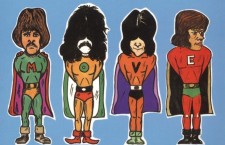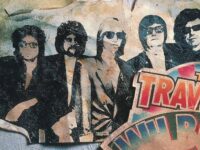Huge in England for a time, but utterly ignored in America, the Move are typically thought of in the states — if they are thought of at all — as nothing more than an antecedent to Jeff Lynne’s Electric Light Orchestra.
It’s a shame because, as these rare, turn-of-the-1970s German broadcasts show, the Move had more than enough personality, verve and sheer musical gamesmanship to stand on their own. Part beat group, part blues band, part ornate pop group, part psychedelic rockers, they may have been, if anything, too interesting for their own good.
The Lost Broadcasts begins with a seminal moment for the Move, and not just because 1969’s “Blackberry Way” — a stamping piece of dark psychedelic pop co-produced by Jimmy Miller of Rolling Stones fame — topped the UK charts. The Roy Wood track, clearly inspired by the Beatles’ “Penny Lane,” signaled a seismic change in the band, as co-founding guitarist/bassist Trevor Burton departed while future ELO keyboardist Richard Tandy contributed a whirling harpsichord.
The Move were, in fact, already a huge success in England, having appeared at the inaugural edition of the Isle of Wight Festival in 1968. But, once again, they failed to chart in America. “Blackberry Way” was, really, the beginning of the end for the Move, which would in a few short years morph into the Electric Light Orchestra.
[SOMETHING ELSE! REWIND: Watch as Jeff Lynne reunites with his former Electric Light Orchestra bandmate Richard Tandy to perform their hit “Evil Woman.”]
The Lost Broadcasts, issued via RadioBremen/Gonza MultiMedia, only later traces back to some of the Move’s earlier successes. There’s the whooping “Fire Brigade, a propulsive piece of jangle pop — save for that way-cool Duane Eddy-inspired riff — that shot to No. 3 in the UK in March 1968 behind Wood’s first lead vocal. But their innate sense of experimental verve was just as often met by stony silence from the record-buying public that craved boring consistency. Witness this set’s fiery, Jimi Hendrix-ish “Wild Tiger Woman,” which sunk like a rock in the summer of 1968 — failing to make even the Top 50 in England.
By the time of the German broadcast of Wood’s thunderously blues-soaked “Brontosaurus,” a No. 7 UK hit from the Move’s 1970 album Looking On, you’ll find one Jeff Lynne playing guitar. Carl Wayne, who had served basically as a co-frontman with Wood from the start, had also departed. (“Curly,” a recorder-driven pop confection sequenced later on Lost Broadcasts, was the last tune to feature Wayne and the first with Rick Price on bass.)
Co-founding Move drummer Bev Bevan and, in particular, Lynne quickly began to exert more influence on the band. The pair composed three of the songs collected in Looking On, then wrote or co-wrote six on Message from the Country, released in October of 1971.
At this point, you can hear what’s coming next: “The Words of Aaron” finds Lynne at the piano, already combining classical concepts with pop — and already sporting his signature sunglasses. Later, back on guitar, Lynne leads a pair of renditions of this raucous, rockabilly-inspired rave up called “Down on the Bay” for the television audience.
But the Move’s second single from Looking On, “When Alice Comes Back to the Farm,” also failed to chart — despite some sizzling slide work courtesy of Wood, as heard here. Elsewhere, there are two takes on the fuzz-grooved “Ella James,” from what would ultimately become the Move’s swan song, an April 1972 EP that also featured their early version of “Do Ya.” The latter, of course, would eventually become a Top 20 hit in America — but for ELO in 1977.
The writing was on the wall. Bill Hunt, a key early sideman with ELO, had already joined the Move, as well. In December 1971, Electric Light Orchestra had been released — featuring songs from Lynne and Wood, and a lineup that also included Bevan, Hunt and Tandy.
The Move would eventually restart as a touring outfit, and its roster currently includes Bevan and Burton. (Wood, who left ELO in 1972 to form Wizzard, is not participating; Wayne passed in 2004.) They remain, however, an enigma outside of the UK. Perhaps The Lost Broadcasts will, however belatedly, help earn them the recognition they’ve so long deserved.
- How Deep Cuts on ‘Music From Big Pink’ Underscore the Band’s Triumph - July 31, 2023
- How ‘Islands’ Signaled the Sad End of the Band’s Five-Man Edition - March 15, 2022
- The Band’s ‘Christmas Must Be Tonight’ Remains an Unjustly Overlooked Holiday Classic - December 25, 2016




